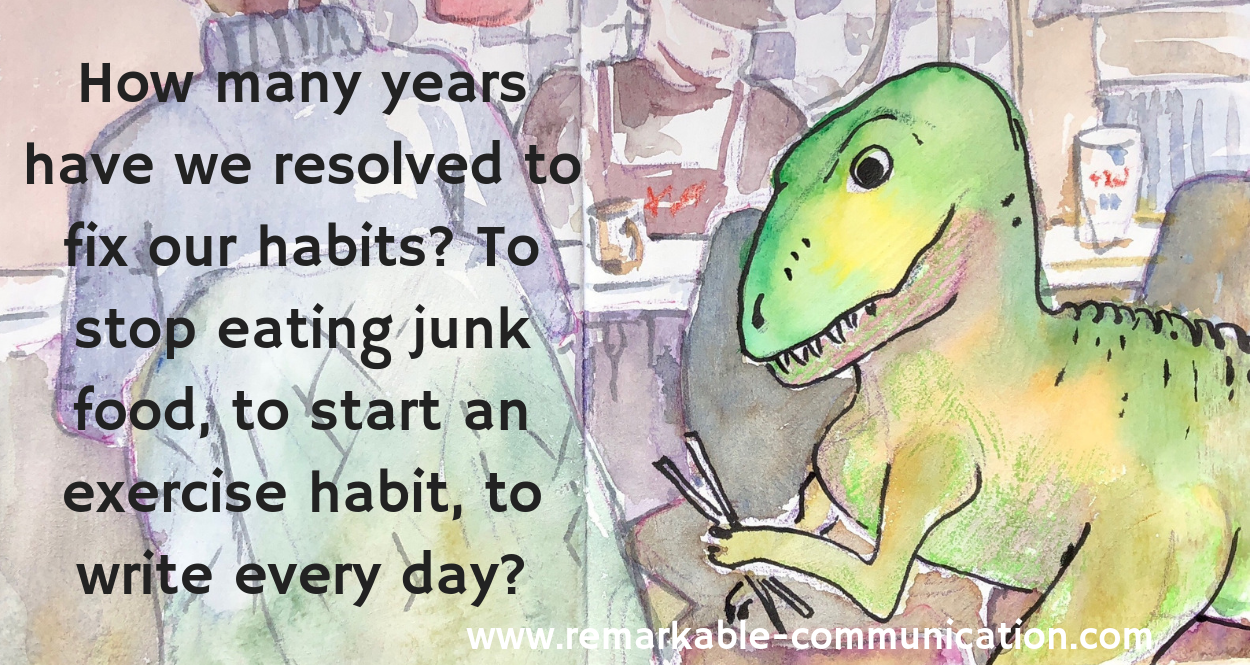You might have seen advice in the past (possibly from me) that habits are the key to making good things happen in your work.
(Also your life, your relationships, your health. It turns out that habits are the key to nearly everything.)
Good habits, even if they’re small, tend to roll up into significant progress.
And bad habits … well, we all know how that goes.
There are a zillion new books and articles on habits right now, because there’s so much good evidence that they work.
But just that word habits can shut us down. (Or spin us off into a not-so-productive habit, like logging into Facebook or Twitter for a heaping serving of social media outrage.)
We all know that we need to make our habits more intentional. We need to cultivate the habits that serve us, and move us toward what we want.
What many of us lack is the faith that we can actually do that.
And how many years have we failed?
No wonder we see that word and our attention just slinks away.
I took a calculated risk bringing it up now. And you are, still with me … so that’s excellent.
Let’s see if we can reframe this.
My new friend, the Comfort Zone Sandwich
I am an intensely habit-driven person. Not all of those habits are great.
But I’ve learned that if I’m thoughtful about it, I can take my collection of existing habits and let new habits catch a ride.
My morning rituals are very stable, because my kid has to get to school, my dog has to get to day care, and my husband has an enviably reliable exercise habit of his own.
So I’m working on a new experiment. As soon as my husband goes out for a swim or a bike ride, I get a cup of tea and knock out one “Pomodoro” (25 minutes) of “important but not urgent” tasks, which I’ve shortened to IBNU.
My existing habit was to ignore IBNU. Partly because often, they’re not the tasks that fit into a steady routine, like weekly deadlines or team meetings. Then those little IBNUs become incredibly urgent, because they’re all overdue. Usually all at the same time.
Which is stressful. And annoying. And counterproductive.
Perhaps you’ve seen this happen in your own life.
Here’s how the Comfort Zone Sandwich works:
- I start with an existing habit (the first piece of bread). In this case, I’ve chosen a cue I can rely on — my husband going out for some exercise.
- Then I add a new desirable habit, the IBNU tasks (these are the sandwich contents).
- Now I need a second piece of bread — and it needs to come from my comfort zone.
That second piece of bread might be going for a quick walk, which I enjoy doing. It might be playing a round of a simple game on my phone.
I decided to make it catching a Pokémon, which combines both of those. Yes, it’s silly. Yes, it’s trivial. But it’s fun and quick, and I can do it pretty much every day.
That’s the comfort zone sandwich. You start from a place of comfort, and end up in a place of comfort. That makes it a lot easier to put the less-comfy bit in the middle.
I’m starting it small — and this one might stay small. 25 minutes a day may be enough to keep all of those IBNU tasks from growing into overdue, angry urgency monsters.
The nice thing about the sandwich is you can make it a “club” — you can use that second piece of bread to kick off another layer of your sandwich. After my quick Pokemon grab, I’ve been sitting down and knocking out 25 minutes of writing.
That means every day I start with a powerful hour — one that isn’t painful or annoying. It’s just something I do, day in and day out.
Maybe habits aren’t sexy, but confidence is.
Excellent work is sexy. Creative output is sexy. Being good at what you do is sexy.
We’re going to work on habits in the writing workshop
I’m excited enough about habits, and have enough evidence from my own creative life about how powerful they can be, that they’re going to be an integral part of the new version of my writing workshop.
Most of our time will still be spent on writing voice — on how to make your words sing, and how to craft writing that’s rich and interesting and delightfully readable.
But every week, we’re also going to touch base on how we can nurture our creative habits.
- We’ll talk about how to use cues to support a new habit. (That’s what the Comfort Zone Sandwich does.)
- We’ll also look at how to mindfully reward ourselves for doing the stuff we want to do. (The Comfort Zone Sandwich hits this one, too.)
- We’ll learn techniques for making habits easier and less Yuk!, so we actually do them. (That’s why the “filling” in the sandwich is just 25 minutes. Not enough to fire off the Yuk response.)
- And we’ll start making time to review and renew our habits, so we keep making progress instead of stalling out. (In other words, we’ll make habit implementation into … a habit!)
Our habit work will add just 5-10 minutes of additional focus to each week’s session. And I’m confident that it will help all of us create the richly productive, meaningful life that we want.
What else happens in the workshop?
We’ll spend 5 creative, fun weeks together (not counting a break at the holidays), focusing our energy into becoming better writers.
Here’s what Sridhar had to say about our first group:
I got some invaluable gifts from the course: It has convinced me that if I show up and practice, my craft will get better over time. It handed me the keys to the Idea Garden where I can now grow my creativity. The classes made me less judgmental towards myself and a much better person, as a whole.”
-Sridhar S.
It’s a supportive, nurturing environment. Just like the Comfort Zone Sandwich, we include plenty of play and fun to offset the creative challenges.
We balance technical craft (topics like storytelling technique and developing analogies) with time to just explore. Because playful exploration is crucial to creativity.
We learn to take more pleasure in words — and in doing that, we learn to craft words that please our readers.
You’ll also get an in-depth Compassionate Critique from me, where I look closely at your writing and help you to see where you can make it stronger and more compelling.
For now, I do 100% of these critiques myself, to make sure they’re respectful, caring, and useful. (I loathe the “tear it to shreds” school of critique. It nearly always does more damage than good, and I don’t do it.)
Art supplies (crayons, glitter, whatever floats your boat) are optional but highly encouraged.
I’m still finalizing our new start date, but it’s coming up soon. Drop your name and email into the form below and I’ll let you know when we’re ready to open the doors again!
Important note for our existing students
For those who joined the very first version of this workshop, you’re automatically eligible to attend our new sessions. You are warmly welcome to join us each week, do the new versions of the exercises, and get all of the new habits material. No extra payment, nothing extra to do.
I want to thank you for the fun, support, and learning that you contributed to our early sessions.
Look for an email soon with details on connecting with the new class!


Leave a Reply